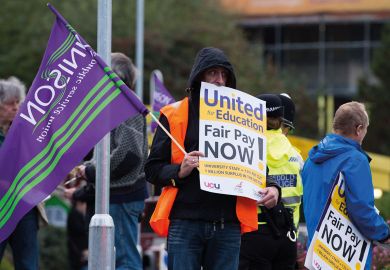UK universities have made a final pay offer promising a minimum pay rise of 1.8 per cent for the next academic year, rising to 3.65 per cent for the lowest paid, but remain at loggerheads with unions.
The offer made by the Universities and Colleges Employers Association, which represents 146 higher education institutions also includes the deletion of the lowest point on the pay scale which, according to Ucea, would enable the lowest-paid staff to be paid more than the voluntary living wage of £9 per hour.
However, the University and College Union said that the offer “does not adequately address” what it saw as real-terms falls in staff pay in recent years. Unions have called for an increase equivalent to inflation as measured by the retail price index – currently 2.4 per cent – plus 3 per cent, or £3,349 – whichever is greater.
Ucea claimed that the national pay spine had “maintained its value in real terms over the past six negotiating rounds”. It said that its offer meant that all staff pay would keep pace with inflation this year as measured by consumer price index, which currently stands at 1.8 per cent once housing costs are included.
Ucea also highlighted that many staff were eligible for additional incremental pay increases which took the average overall rise to 3.4 per cent.
The offer was “very carefully balanced between meeting colleagues’ pay aspirations and our participating HE institutions facing some exceptional financial challenges, including large increases in employer pension contributions, and a raft of uncertainties around funding, student recruitment and Brexit”, employers said.
“The offer ensures that pay in the sector maintains its value in real terms for the sixth year running, demonstrating the investment the sector continues to make in its highly valued employees,” said Mark Smith, Ucea’s chair and Lancaster University’s vice-chancellor.
“I am pleased that a constructive and considered negotiation took place and we very much hope that our colleagues will value this commitment to maintain an attractive total reward package despite the unprecedented challenges facing HE institutions.”
However, Paul Bridge, UCU’s head of higher education, said that the pay offer did not go far enough.
“The pay claim has a ‘keep up and catch up’ element to address the years of wage suppression that has seen the value of staff pay in higher education fall by 20 per cent in real terms,” he said. “This latest offer does not adequately address that problem, nor does it reflect the higher increases in the cost of living shown by other measures of inflation.
“It also fails to commit to meaningful action on the gender pay gap, casualisation and workloads. Our negotiators will report back to branches and the offer, and next steps will be discussed at the higher education sector conference as part of our annual congress at the end of the month.”
UCU called a ballot for strike action over a 2 per cent pay rise for 2018-19, which rose to 2.8 per cent for the lowest paid. While 70 per cent of voting members supported a walkout, the 41 per cent turnout was shy of the 50 per cent threshold required for industrial action.




